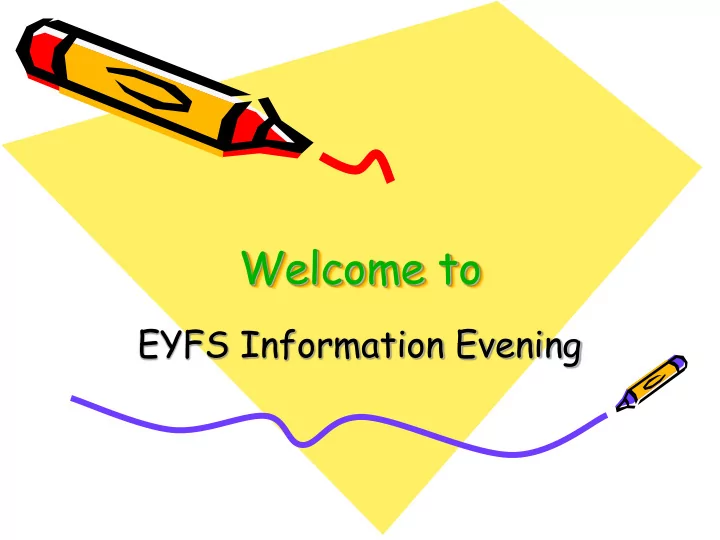

Welcome to EYFS Information Evening
What is the Early Years Foundation Stage? The Early Years Foundation Stage (E.Y.F.S.) is the stage of education for children from birth to the end of the Reception year. It is based on the recognition that children learn best through play and active learning. This is a very important stage as it helps your child get ready for school as well as preparing them for their future learning and successes. From when your child is born up until the age of 5, their early years experience should be happy, active, exciting, fun and secure; and support their development, care and learning needs.
Your child will be learning skills, acquiring new knowledge and demonstrating their understanding through 7 areas of learning and development
Children should mostly develop the 3 prime areas first. These are: 1. Communication and language 2. Physical development 3. Personal, social and emotional development.
As children grow, the prime areas will help them to develop skills in 4 specific areas . These are: 1. Literacy; 2. Mathematics; 3. Understanding the world; and 4. Expressive arts and design.
Personal, Social and Emotional Development The children will be learning to: • become self-confident; • have awareness of their own feelings and feelings of others; • take an interest in things; • become independent; • tell the difference between right and wrong.
Play games which encourage turn taking and sharing. Talk about feelings and how things make others feel. Encourage your child to dress themselves and put their coat on independently.
Communication and Language The children will be learning to: • talk confidently and clearly; • show awareness of listener • enjoy listening to stories, songs and poems, showing good attention; • follow instructions; • answer questions about stories
Chat, speak and whisper to your child! Explain new words which they haven’t come across before to the children. Make play phones from cups to encourage speaking and communicating.
Physical Development The children will be learning to: • move confidently; • control their body; • handle equipment. • manage their own basic hygiene and personal needs including dressing and undressing independently
Play ball games and other games which involve physical activity. Take a trip to the park, so your child gets the opportunity to run, jump and climb. Activities which involve cutting and sticking. Make play dough (we can give you a recipe!) Sewing.
Literacy The children will be learning to: hear and say sounds, and link them to the alphabet; read and write familiar words and sentences; learn to use a pencil effectively.
• Share the books with your child (not just once!) • Take trips to the library. • Encourage your child to write cards or messages to people. • Talk about stories, what the children like and dislike about them. • Talk about print in the environment, such as road signs & symbols.
Mathematics The children will be learning to: • develop an understanding of maths through stories, songs, games and imaginative play; • become comfortable with numbers and with ideas such as 'heavier than' or 'bigger’; • be aware of shapes and space.
Sing number rhymes, such as 1, 2, 3, 4, 5. Play board games such as Snakes ands Ladders to practice counting. Ask your child to help you solve problems e.g. I have 2 apples, but there are 4 of us, what shall I do? Cooking. Look at numbers on doors whilst walking-can the children tell you what number it is?
Understanding the World The children will: • explore and find out about the world around them, asking questions about it; • build with different materials, know about everyday technology and learn what it is used for; • find out about past events in their lives and their families' lives; • find out about different cultures and beliefs.
Talk to your child about your family, your religion and where you live. Talk about what you see, hear, taste, touch and feel. Ask your children to help you when using equipment such as computers.
Expressive Arts and Design The children will explore: • colours and shapes; • making things; • role play; • making music and singing songs
Make some shakers or other musical instruments using dried peas and plastic cups. Play games such as musical statues. Uses boxes to make models. Keep old clothes, hats, shoes to make a box of dressing up clothes!
Monitoring Progress Each of the 7 areas of learning has its own set of Early Learning Goals’ which determine what most children are expected to achieve by the end of Reception Class. We use Development Matters to identify the developing knowledge, skills, understanding and attitudes that children will need if they are to achieve the early learning goals by the end of the EYFS. These statements will be updated regularly throughout the year to show your child’s development and areas where they need further support. Please see handout
“Adults who help children to play are adults who help children to learn.”
Please remember…. If you have any concerns or questions, we will be happy to help you.
Recommend
More recommend